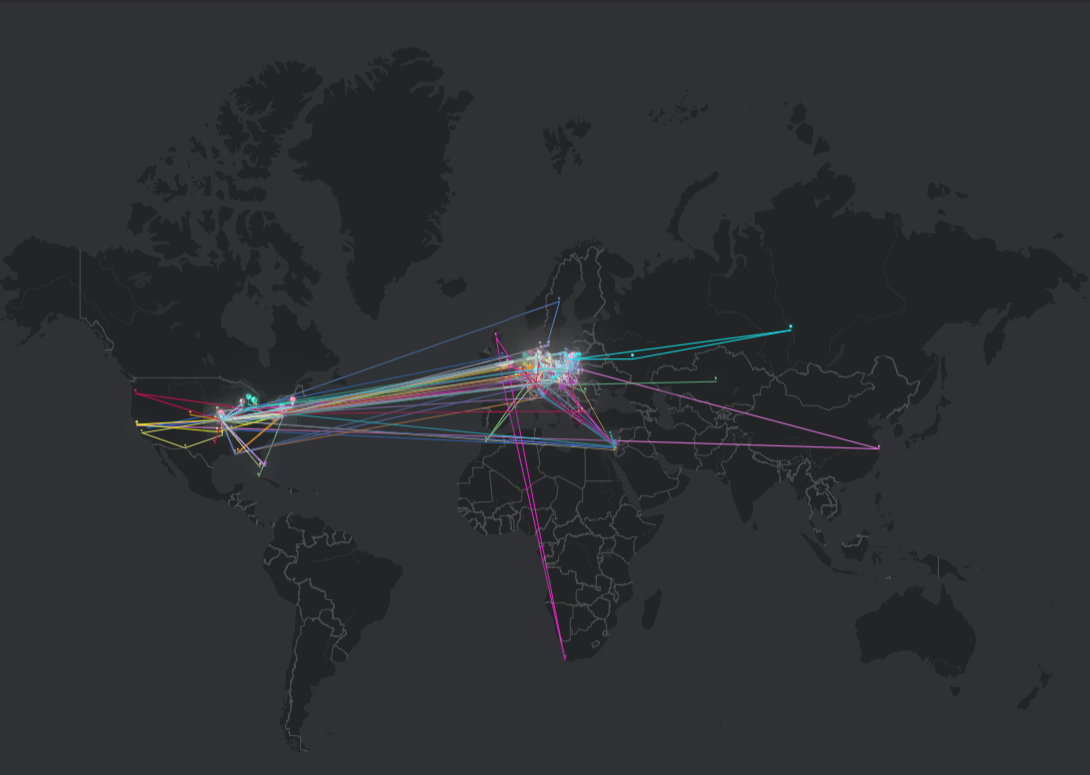The Midwest Center for Holocaust Education (MCHE) has announced “Through Hell to the Midwest,” a mapping project that traces the stories of survivors who settled in the Kansas City area.
Additionally, the University of Kansas Jewish Studies Program will host a presentation on the project on Nov. 14 in partnership with the History and Philosophy Departments at Fort Hays State University.
MCHE’s collection of Holocaust survivor testimonies, the Witnesses to the Holocaust Archive, is the centerpiece of its teaching resources. Preserving the testimony and ensuring that it is used responsibly in service of teaching the lessons of the Holocaust is the measure by which MCHE evaluates all requests to utilize the testimonies. One such request came to MCHE from Dr. Amber Nickell and Professor Hollie Marquess in the Fort Hays State University history department. As longtime MCHE partners, they had a vision for an innovative project utilizing the testimonies, which became “Through Hell to the Midwest.”
Using oral history testimony collected by MCHE and dually housed in the Fortunoff Archive at Yale University, they have meticulously followed the path of each survivor in the archive, tracing their steps from their hometowns in Central and Eastern Europe through their Holocaust experiences to their new lives in Kansas and Missouri.
“Working on this project has been incredibly rewarding,” Marquess said. “We hope this can function as a teaching tool for future generations, and we look forward to expanding the project to trace the experiences of other Midwestern survivors.”
Stephen Naron, director of the Fortunoff Video Archive for Holocaust Testimonies at Yale, called the project remarkable due to the collaboration of scholars, students, archivists and educators to visualize the movements of survivors with modern technology.
“But, more importantly,” he said, “on a collective level, since these are all survivors who landed for one reason or another in Kansas City, it is a reminder of the fact that the Holocaust is not some history far remote in space and time, but a history that is close to home and an integral part of the American experience. These KC survivors could have been your neighbors, and thus, their wartime struggle and pain, their family histories as well as their multifaceted contributions to postwar life in Kansas City are part of our story as well.”
Maps, documents and patterns
The maps allow learners to gain a sense of the movement of survivors over vast swaths of Europe and to understand how much movement was common in these experiences. By layering the maps, learners can identify patterns based on the survivor’s country of origin, shared experiences and family connections. The maps are interactive and take the user not only to well-known locations like the Lodz Ghetto and Auschwitz but also track unique locations mentioned by survivors, such as hiding places and references to being near other locations.
In addition to highlighting the oral histories and tracing the survivors’ paths, the project has secured any available documents from the International Tracking Service — an internationally governed archive containing documents from Nazi and Displaced Persons Camps — and connected them to the survivors’ profiles.
Countering denial
“In MCHE’s earliest years, our focus was on capturing and preserving survivor testimonies,” said MCHE Executive Director Jessica Rockhold about the impact of the project. “In the intervening years, our focus shifted to making them accessible and, even more importantly, allowing them to live in the current moment. Access is important, but ensuring their relevance in the world today is critical.
“This mapping project is a remarkable achievement in terms of accessibility and relevance,” she continued. “It makes the survivors’ experiences real and concrete in a way that only geography can and, by adding the documents, it clearly refutes any attempt at denying that this happened. We are grateful that the survivors’ stories will move forward in such a dynamic and engaging way.”
The “Through Hell to the Midwest” project is ongoing, and new testimonies are being added. An initiative is underway with the families of the survivors to supplement the materials available in each profile.
More information is available at mchekc.org.
Presentation at KU
The University of Kansas Jewish Studies Program’s presentation on the project will be held at 5:30 p.m. on Thursday, Nov. 14, in the Pine Room at the Kansas Memorial Union (1301 Jayhawk Blvd, Lawrence, KS 66045) and virtually.
Pre-registration is required at kusurvey.ca1.qualtrics.com/jfe/form/SV_9oTnMCRw9Qt2xqC.
The event will feature insights from the co-creators from Fort Hays State University: Dr. Amber Nickell, an assistant professor of history who specializes in Holocaust and genocide studies, historical geographies and Central and Eastern European history; and Hollie Marquess, a lecturer in the school’s history program with expertise in gender and sexuality studies, American Midwestern history and social-cultural history.
In addition to the partnership with the History and Philosophy Departments at Fort Hays State University, cosponsors from KU include the Department of Religious Studies; Department of History; Global & International Studies; Department of Geography; Department of Slavic, German, and Eurasian Studies; Department of Anthropology; American Studies; The Max Kade Center for German American Studies; Center for Russian and Eastern European Studies; The Institute for Digital Research in the Humanities; and the Jewish Faculty & Staff Council.
Community co-sponsors include KU Hillel, KU Chabad, The Midwest Center for Holocaust Education and the Lawrence Jewish Community Congregation.
More information and registration is available at kujewishstudies.ku.edu/through-hell-midwest-holocaust-mapping-project.



